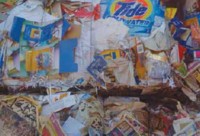On the Road to Zero Waste
 Local governments in British Columbia are spending a lot of time and energy these days figuring out how to better manage our garbage. This is particularly true in Metro Vancouver, as the closure of the Cache Creek Landfill looms on the horizon.
Local governments in British Columbia are spending a lot of time and energy these days figuring out how to better manage our garbage. This is particularly true in Metro Vancouver, as the closure of the Cache Creek Landfill looms on the horizon. Soon decisions will be made about where to put our garbage and how we will go about reducing the overall amount that we produce. Everyone from politicians to the public already agrees that the 3Rs (Reduce, Reuse and Recycle) are integral components of any garbage management plan. Metro Vancouver has stated it would like to see this region move from 52 per cent diversion to 70 per cent. The question is, what can local government do to close that gap and how can they do it?
To help fill the information gap, and spread knowledge to all areas of the province, the Recycling Council of B.C. has released its latest in a series of informational reports, entitled On The Road to Zero Waste: Priorities For Local Government. The report provides guidance to municipal and regional governments across the province on the actions, tools and opportunities available to them to increase the 3Rs and move closer to achieving zero waste.
It is estimated that each British Columbian, on average, disposes of over 600kg of waste each year. Waste has become such an everyday part of our lives, it’s almost impossible to envision life without it.
“There are myriad ways that local governments can use the powers already available to them to make progress on reducing the amount of garbage that goes to disposal, “says RCBC Executive Director Brock Macdonald. “One good example from the report is to implement a sliding-scale fee for demolition and construction permits that provides economic incentives to projects where materials are diverted away from landfill and are reused or recycled.” The Village of Canmore in Alberta is already trying out just such a system.
Added Macdonald, “another good tactic is diverting organics such as kitchen scraps and yard waste from landfill or incineration. Organics make up about 40 per cent of the garbage we produce here in the lower mainland. So an option available to local governments is to implement community organics collection and composting programs. Metro Vancouver Regional District is developing a program for this area and the community of Ladysmith on Vancouver Island is already up and running.”
These are just two of many recommendations made in the 16 page report which is available in PDF format at RCBC’s web site at: www.rcbc.bc.ca/education/rcbc-publications
The Recycling Council of British Columbia is a multi-sectoral, non-profit organization promoting the principles of zero waste through information services, research and the exchange of ideas.
Founded in 1974, RCBC is Canada’s longest-serving recycling council and has earned the reputation of being one of the most widely respected environmental organizations in the province today. RCBC has played a major role in the establishment of the many ground-breaking product stewardship programs in the province, which are emulated around the world.

